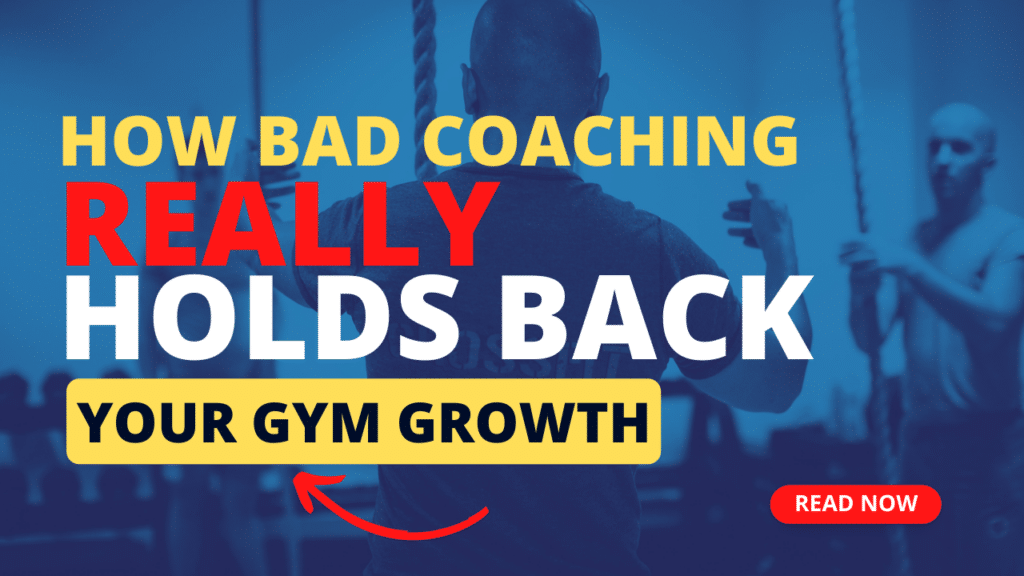To provide an optimal member experience in a CrossFit gym with larger class sizes, coaches must possess several key skill sets. As an owner, part of your commitment should be to the ongoing development of your staff to develop these competencies.
An incompetent staff can hurt the growth potential of CrossFit gyms by leading to poor workout experiences, negative word-of-mouth, high turnover, and limited growth potential. Gym owners need to set standards, maintain awareness, and invest in ongoing staff development to achieve long-term success.
Developing staff internally is important for Boxes and CrossFit gyms because it allows gym owners to create a culture of ongoing learning and development. While certifications are important and demonstrate a certain level of knowledge and competency, they do not necessarily guarantee that the coach has the necessary skills, experience, or personality to deliver an optimal workout experience.
Developing staff internally can help CrossFit gyms to provide a more personalized and effective workout experience to members, even with larger class sizes. With improved staff competency, coaches can manage class dynamics, communicate effectively, and offer personalized attention to each member, rather than simply running classes in a robotic manner. This can lead to increased member satisfaction and retention.
In order to know what needs development, we need to define those skills. Communication skills, organizational skills, technical skills, motivational skills, adaptability, and interpersonal skills are all important subjective skills that CrossFit coaches should possess. While these skills are difficult to measure quantitatively, they play a crucial role in delivering an optimal workout experience to members.
Subjectively grading these skills should be part of regular performance reviews and the theme behind ongoing coaching development in your gym.
A coach who is highly competent in these skills can manage a larger class size while still providing personalized attention to each member, which results in happy members who stay longer.
Here are 6 of the most critical skills required by a Coach:
- Communication Skills: Effective communication is essential for coaches to provide an optimal member experience in larger class sizes. Coaches must be able to clearly and concisely convey instructions, feedback, and encouragement to members during workouts. They must also be able to listen actively to members’ concerns and adjust their coaching style to meet individual needs.
- Organizational Skills: Coaches must possess excellent organizational skills to manage larger class sizes effectively. They should be able to create and implement effective workout plans, manage equipment usage, and coordinate members during workouts. Coaches must also be able to maintain an appropriate coach-to-member ratio to ensure that all members receive personalized attention.
- Technical Skills: Coaches must have a strong understanding of the technical aspects of CrossFit workouts, including proper form, technique, and safety protocols. They must be able to identify and correct common form mistakes to minimize the risk of injury.
- Motivational Skills: Coaches must be able to motivate members during workouts, especially in larger class sizes. They should be able to provide positive feedback, encouragement, and support to help members achieve their fitness goals. Coaches should also be able to create a competitive and supportive environment that fosters teamwork and camaraderie among members.
- Adaptability: Coaches must be adaptable and able to adjust their coaching style to meet the needs of members in larger class sizes. They should be able to modify workouts, provide alternative exercises, and adjust the coach-to-member ratio as needed to ensure that all members receive personalized attention.
- Interpersonal: Skills Coaches must have strong interpersonal skills to build relationships with members and create a positive gym culture. They should be approachable, friendly, and empathetic, making members feel comfortable and welcome in the gym.
Overall, coaches must possess a diverse set of skills to provide an optimal member experience in larger class sizes. They must be excellent communicators, organizers, and motivators, with strong technical skills, adaptability, and interpersonal skills. With these skills, coaches can create a supportive and competitive environment that motivates members to achieve their fitness goals.
As your gym grows, your coach’s ability to manage larger classes will become important as it is often the largest hindrance to continued growth and also the largest contributor to rising membership churn rates as your gym scales. In having effectively helped 100’s of gyms grow, we have often approached this as the first adversity a gym owner experiences as they scale up.
It’s very hard to pain in broad strokes or standardize coach-to-member ratios because it really comes down to a coach’s skills and ability. In my time as an athlete, I’ve personally experienced classes where the coach delivered a poor experience with a class of 5 people in it, and I have been part of class experiences where the coach was orchestrating groups of 30 members effectively and delivering an amazing member experience.
While many other factors contribute to a scaleable class experience like workout programming, equipment availability, space, and class format, it’s important to remember that the coach is the key factor in delivering a high-quality workout experience, regardless of class size.
As such, rather than focusing on a specific coach-to-member ratio, Box’s, Studios, and CrossFit gyms should prioritize developing their coaches’ skills and abilities to manage larger class sizes effectively. This includes providing targeted training and coaching on class management techniques, effective communication skills, and personalized attention strategies.
Additionally, gym owners can use data and member feedback to evaluate the effectiveness of coaches in managing larger class sizes and adjust coaching assignments and training programs accordingly. By prioritizing the development of coaches’ skills and abilities, CrossFit gyms can provide a high-quality workout experience to members, regardless of class size, ultimately leading to increased member satisfaction and retention.


